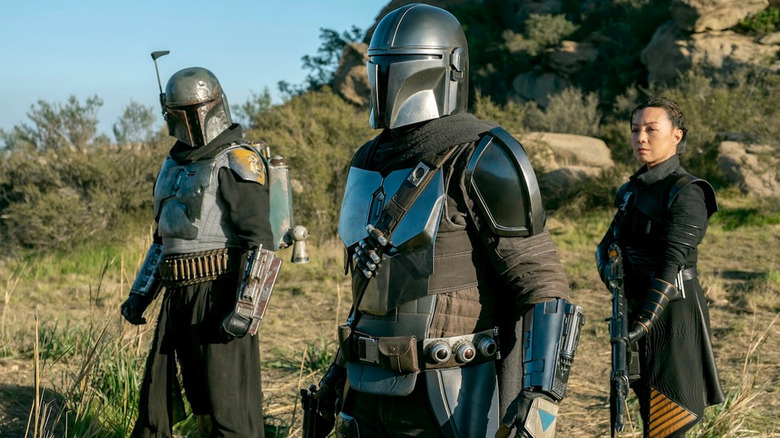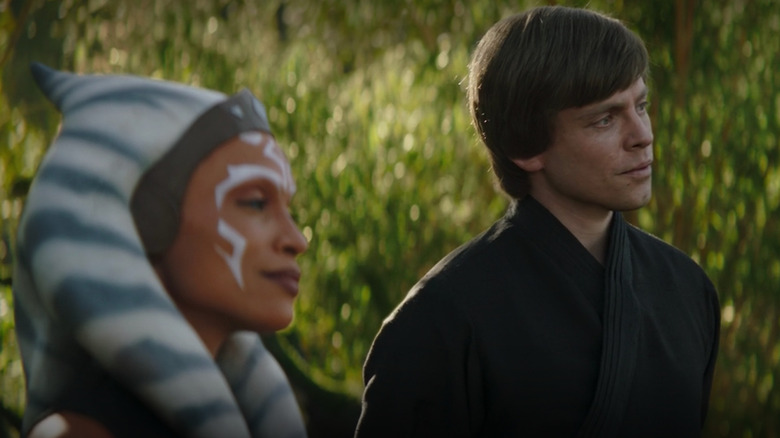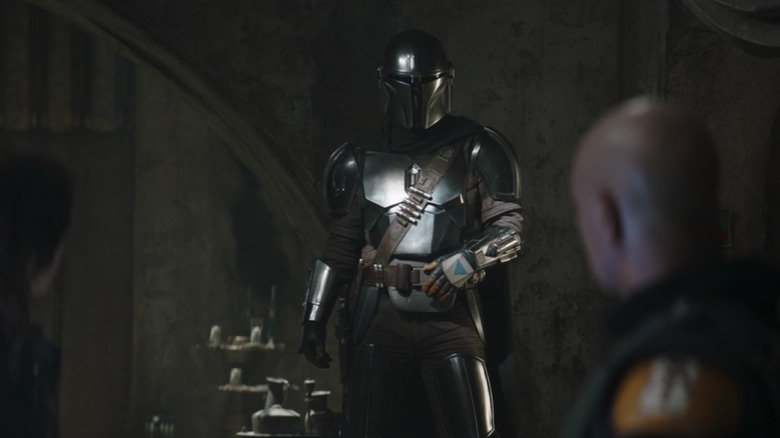Is The Book Of Boba Fett Taking Fan Service Too Far?
Warning: Spoilers follow for the new episode of "The Book of Boba Fett."
It's every fan's dream: after months of wishing and hoping, months more of thinking and praying, and tweeting into the void and signing countless petitions to various showpeople... the thing that you wanted to happen in that TV show or film series you love so much has finally come to pass. That character you adore has returned — and in a substantial cameo, too! It's everything you ever wanted. So why does it all still feel so hollow?
The latest episode of "The Book of Boba Fett," directed by "Star Wars" native son Dave Filoni, seemed to deliver everything but a substantial appearance from our titular ex-bounty hunter. For some, that's a-okay, as the episode is chock full of some of the most promising IP this side of the original trilogy. Not only is Din Djarin here to stay after his appearance in episode 5, but his side quest from "The Return of the Mandalorian" has brought Luke Skywalker, Ahsoka Tano and yes, even Grogu, back for a whopping 20-minute segment. On top of that, Timothy Olyphant's Cobb Vanth got a generous slice of screen time. His appearance even helped to usher a key character from the animated series into live action: the bounty hunter Cad Bane.
All this excitement has many a "Star Wars" fan reaffirming Filoni's appointment as the savior of the franchise. In a lot of ways, his episode stands out as one of the strongest we've seen from "The Book of Boba Fett" so far. But it also comes with several distractions that remove us from Boba Fett's task on Tatooine — and to a smaller (but equally vocal) group within the fandom, it all feels a lot like fan service.
When Fan Service Serves a Purpose
The term "fan service" has been wielded to rather negative effect in recent years. To some of the more optimistic among us, fan service is no big deal. In fact, most tend to welcome it. In the case of "Star Wars" (and the neighboring Marvel and Disney properties), fan service has become more and more en vogue. The franchise has certainly taken a page from Marvel's book and embraced the practice of interconnected storytelling. Characters from the original trilogy are free to return with the help of visual effects, as are characters who'd previously been limited to animated series. It's all fair game, and it's made for some surprising (and satisfying) developments in the galaxy far, far away.
I won't pretend like fan service has never appealed to me. In fact, it still does. I can admit that seeing Luke Skywalker again so soon (thanks to some drastically-improved visual effects) filled me with a wild sense of comfort. Seeing Cad Bane stride into Mos Pelgo stunned me in a similar fashion. But it's hard to hold on to the childlike giddiness that the "The Book of Boba Fett" delivered when you realize how it distracts from the series' original intentions.
When used right, fan service works wonders — as seen with the success of "Spider-Man: No Way Home" — but not as a placeholder for an actual storyline or character development. "The Mandalorian" came dangerously close to capsizing with the weight of all the cameos, callbacks and tie-ins to established "Star Wars" lore in its second season. Every episode seemed to serve as a back-door pilot for a number of spin-offs. Fortunately, the series has a strong (if not simple) story to keep it afloat, and to keep things from straying into too-familiar territory.
"Book of Boba Fett" seemed to have an identity crisis from the beginning. What was billed as an exploration of the criminal underworld became a much-tamer melting pot of the genres that "Star Wars" draws influence from. Neither Boba nor co-lead Fennec Shand have been effectively utilized, and apart from an interesting redemption for the Tusken Raiders, no new ideas have been shared. Reintroducing Din Djarin and Grogu was always inevitable, but "The Book of Boba Fett" is doing too much too fast — to the point where the past two episodes might as well be the season 3 opener for "The Mandalorian."
The Mandalorian in the Room
It's always fun to see the return of a minor character who never got their chance to really shine (which, to be clear, is not the case for any of the characters who appeared in "Boba Fett" this week). But did their appearances actually make sense in terms of the larger story? Or was it more a tool used to deflect from a threadbare plot? Once the initial awe wears off — and it will wear off — all you're left with is questions, and a dose of time-released criticism. It's a bit like that spoonful of sugar... or rather a bowl filled with sugar and nothing else of substance. You get what you want initially, but after a while you start to miss the meat and potatoes.
In theory, there's no problem with fan service. But more often than not, looking back too often creates a dependence on nostalgia instead of fresh, innovative storytelling. This has been a major problem for "Star Wars" in recent years. It feels doubly disappointing compared to some of Filoni's earlier work with the animated series, "Star Wars: Rebels" especially. It borrowed lesser-known lore and even brought back fan favorites like Yoda when necessary, but it still forged ahead by building on the established foundation.
Now, everything feels like a big nostalgic cycle, one that essentially makes each piece of "Star Wars" media an essential bit of homework for even the most casual viewers. Tying everything together through fan service is an effective way to pacify the more vitriolic sects of the fandom, but it sacrifices the story to please the fans — a noble endeavor, but still a disappointment in the grand scheme.
With only one episode remaining for "The Book of Boba Fett," it's not clear how exactly all these disparate threads will be brought together. Whatever happens, a satisfying end to Boba Fett's arc seems out of the question, but at least we'll have Cad Bane to entertain us for a little while.


